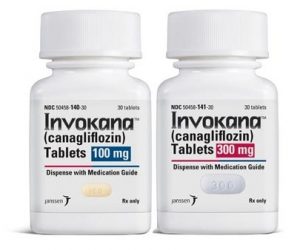 In March 2013, the FDA approved a type 2 diabetes drug known as canagliflozin. The drug, also known by its Johnson & Johnson brand name, Invokana, has since been known to have potentially dire consequences for patients using the medication. In 2015, the agency warned consumers that the drug increases the risk of ketoacidosis – a condition where the body manufacturers high quantities of blood acids, which can lead to respiratory issues, vomiting, fatigue and nausea, to name a few associated symptoms. The FDA required manufacturers to add labels to all sodium-glucose cotransporter-2 (SGLT2) drugs, including Invokana. The agency’s decision was bolstered by a study published by the Journal of American Medical Association, which found that SGLT2s increased the risk of urinary tract infections and kidney damage.
In March 2013, the FDA approved a type 2 diabetes drug known as canagliflozin. The drug, also known by its Johnson & Johnson brand name, Invokana, has since been known to have potentially dire consequences for patients using the medication. In 2015, the agency warned consumers that the drug increases the risk of ketoacidosis – a condition where the body manufacturers high quantities of blood acids, which can lead to respiratory issues, vomiting, fatigue and nausea, to name a few associated symptoms. The FDA required manufacturers to add labels to all sodium-glucose cotransporter-2 (SGLT2) drugs, including Invokana. The agency’s decision was bolstered by a study published by the Journal of American Medical Association, which found that SGLT2s increased the risk of urinary tract infections and kidney damage.
Drug Defined
How does this type of drug work? SGLT2s lower blood sugar levels in diabetes patients by inducing the body to shed glucose via the urinary tract. In some cases, the body has gone overboard, shedding more than just glucose. This has led to some of the problems described above.
Risk of Amputation
More recently, in May of this year, the FDA released a notice telling the manufacturers of Invokana to include the most prominent type of warning (known as the black box) on the medicine containers. The decision to include warning labels came on the heels of a study released in July showing that Invokana was linked to a two-fold increase in the risk of lower limb amputation. The label is supposed to warn of this heightened risk.
It should be noted that the drug has also been linked to diabetic ketoacidosis as well as heart attacks and various heart conditions. The medication can sometimes block patients’ arteries, which can in turn cause heart attacks. Cutting off the flow of blood can also lead to nutrient deficiency in certain parts of the body.
Multidistrict Litigation
The FDA’s notice came not long after the consolidation of 230 lawsuits against J&J into a Multidistrict Litigation overseen by a US District Court in New Jersey. Plaintiffs in those cases argue that J&J (and its subsidiary Janssen) did not adequately test Invokana prior to pushing it onto the market. Additionally, the lawsuits claim that the company did not sufficiently warn the public of the health risks associated with the drug even though J&J allegedly knew about the risks.
Reduced Profits
J&J has felt the consequences of these recent revelations. Invokana brought in $71.9 billion in 2016, a pretty significant increase (2.6 percent) relative to the previous year. The increased profits were the result of an effort to market the drug via a vast advertising campaign. All of that growth seems to have gone out the window; earlier this year, in the first quarter of 2017, the company saw a 16.8 percent drop in US-based sales.
Risks Outweigh the Benefits
The drug sold like hot cakes due to short term benefits like weight loss, lower systolic blood pressure and fewer episodes of Hypoglycemia. In addition, a patient only needs to take the drug once a day, so it’s not as much of a daily burden. But when you weigh these benefits against the horrific risk of amputation, it’s not hard to see that Invokana and related drugs like Invokamet, and Invokamet XR are probably not worth the trouble.
If you or a loved one have suffered due to Invokana, please call Panzavecchia & Associates, PLLC for a free claim evaluation. Having professional help can help you obtain the remuneration you deserve.
